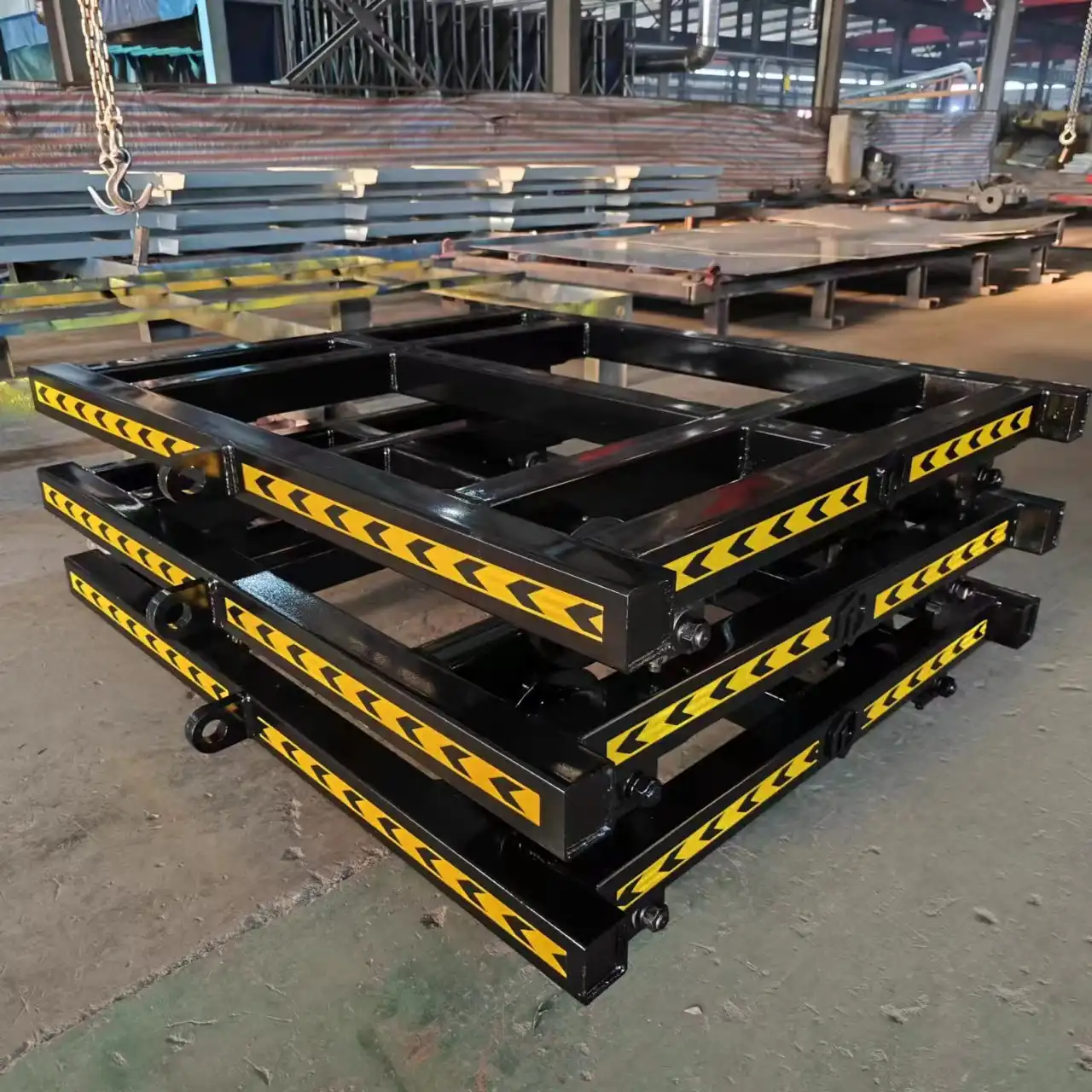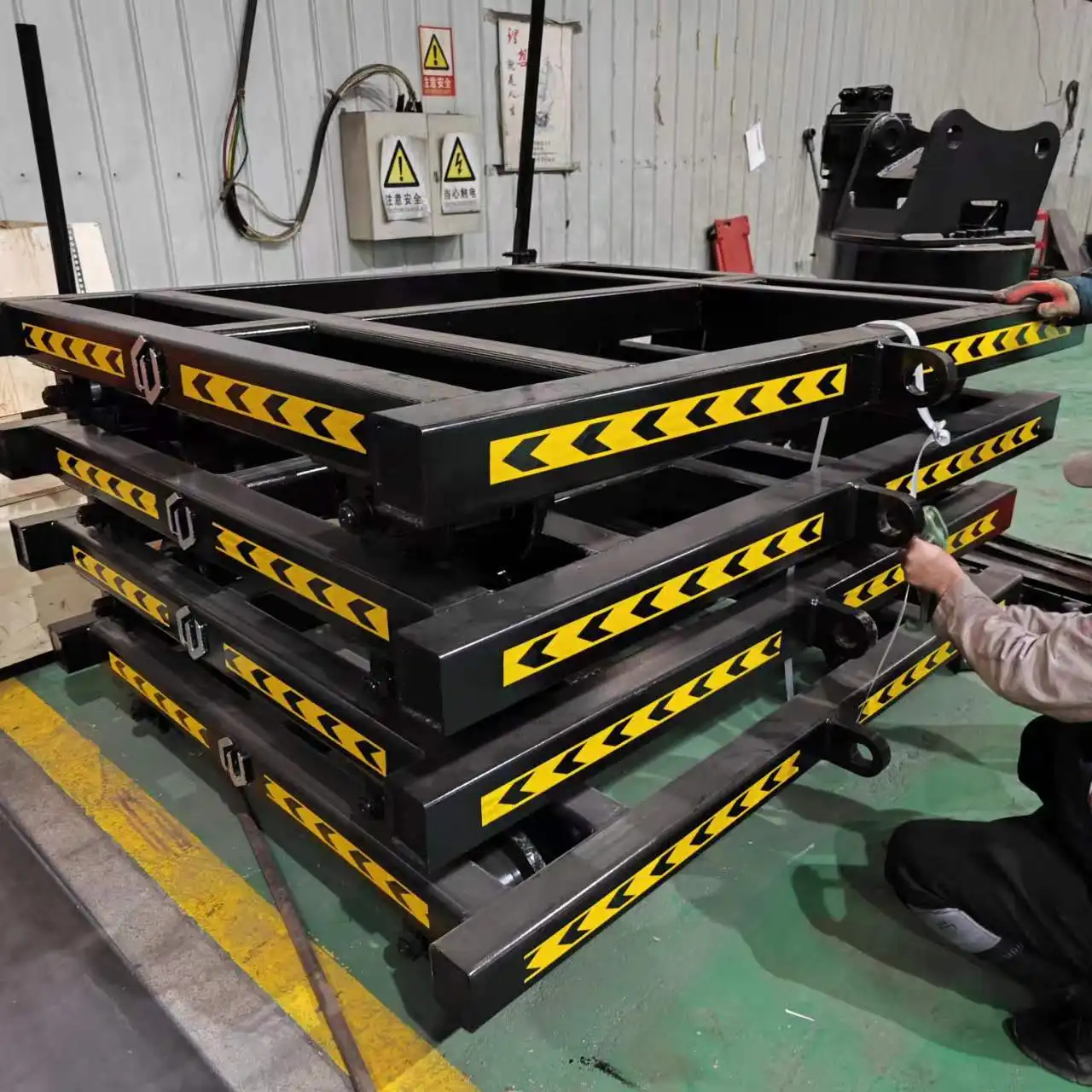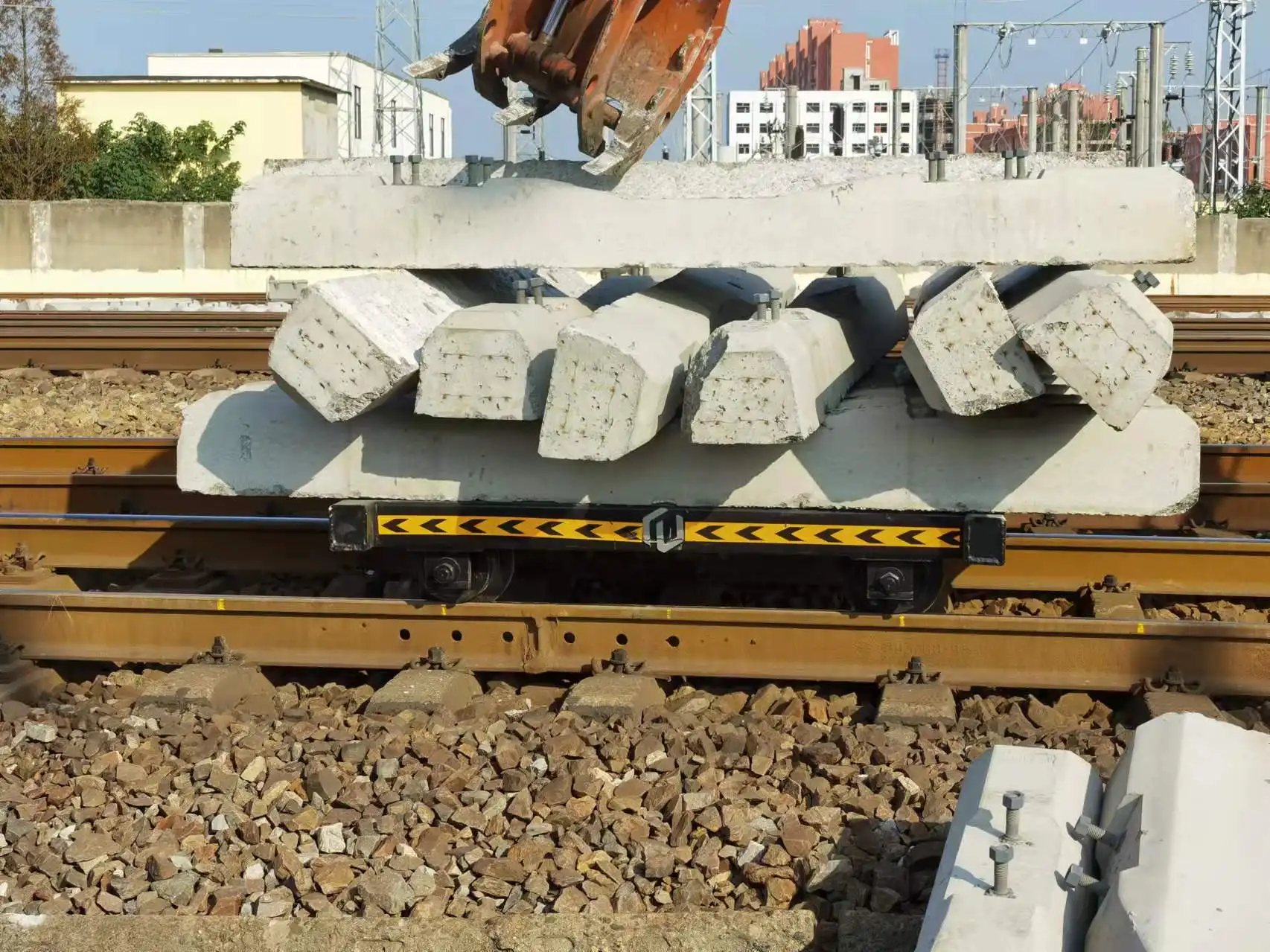Industrial Rail Cart For Transport Materials
Industrial rail carts are indispensable tools in various sectors, revolutionizing material transport across railway maintenance, construction, and mining industries. These versatile vehicles efficiently move heavy loads along tracks, streamlining operations and boosting productivity. From carrying equipment to transporting raw materials, railcarts offer a reliable solution for businesses seeking to optimize their logistics. With customizable designs and various drive options, these carts cater to diverse industry needs, ensuring smooth material handling in even the most challenging environments.
Function
Efficient Material Handling in Railway Maintenance
In the realm of railway maintenance, industrial rail carts shine as essential workhorses. These robust vehicles excel at transporting heavy tools, replacement parts, and maintenance equipment along tracks, allowing crews to swiftly address repairs and conduct routine upkeep. By eliminating the need for manual carrying or using less efficient transport methods, rail track trolleys significantly reduce downtime and enhance overall maintenance efficiency.
For instance, when replacing railway sleepers, these carts can easily transport multiple sleepers at once, saving countless trips and minimizing physical strain on workers. Similarly, during track inspections, railcarts can carry sophisticated diagnostic equipment, enabling thorough examinations without compromising speed or accuracy.
Versatile Applications in Construction and Mining
Beyond railway maintenance, industrial rail carts prove their worth in construction and mining operations. In underground mining, these carts navigate narrow tunnels with ease, ferrying ore, equipment, and personnel safely and efficiently. Their ability to handle substantial loads makes them ideal for removing excavated materials or bringing in support structures for tunnel reinforcement.
In construction, rail track trolleys facilitate the transport of building materials across large project sites. Whether it's moving concrete, steel beams, or prefabricated components, these carts ensure a steady flow of supplies, keeping projects on schedule and reducing reliance on more expensive or less maneuverable transport options.
Customizable Designs for Specific Industry Needs
One of the key advantages of industrial rail carts is their adaptability. Manufacturers offer a wide range of customizable features to meet specific industry requirements. For instance, carts used in chemical plants might include corrosion-resistant materials and sealed compartments for safe transport of hazardous substances. In contrast, those used in forestry might feature reinforced beds and higher sides to securely carry logs or wood chips.
This flexibility extends to size and load capacity as well. From compact carts designed for tight spaces to massive vehicles capable of hauling several tons, there's a railcart solution for every need. Some designs even incorporate modular components, allowing businesses to reconfigure their carts as operational needs evolve.

Drive Options
Electric-Powered Rail Carts for Eco-Friendly Operations
As industries worldwide pivot towards sustainability, electric-powered rail carts are gaining traction. These environmentally friendly options offer several advantages over their fossil fuel counterparts. They produce zero emissions during operation, making them ideal for enclosed spaces like warehouses or underground mines where air quality is a concern. Electric carts also tend to be quieter, improving working conditions and reducing noise pollution.
Moreover, electric rail track trolleys often have lower maintenance requirements. With fewer moving parts compared to combustion engines, they experience less wear and tear, potentially leading to reduced downtime and lower long-term operating costs. Many models now feature advanced battery technology, offering extended run times and quick charging capabilities to ensure minimal disruption to operations.
Diesel-Driven Carts for High-Power Performance
While electric options are on the rise, diesel-powered rail carts remain popular in many industries, particularly where high power output is crucial. These robust vehicles excel in challenging environments, such as steep gradients or when hauling exceptionally heavy loads. Diesel carts can operate for extended periods without needing to refuel, making them suitable for remote locations or continuous operations where charging infrastructure might be limited.
Recent advancements in diesel engine technology have also improved fuel efficiency and reduced emissions, addressing some of the environmental concerns associated with these powerful machines. Some modern diesel railcarts incorporate hybrid systems, combining the strength of diesel engines with the efficiency of electric motors for optimal performance across various operating conditions.
Manual Push Carts for Short-Distance Transportation
For shorter distances or in areas where powered vehicles are impractical, manual push rail carts offer a simple yet effective solution. These human-powered carts are often used in maintenance yards, small workshops, or as auxiliary transport in larger operations. Their simplicity translates to lower costs, both in terms of initial investment and ongoing maintenance.
Manual carts are also highly maneuverable, allowing workers to navigate tight spaces with precision. Many designs incorporate ergonomic features like adjustable handles or assisted braking systems to reduce physical strain on operators. Despite their basic nature, these carts can still handle substantial loads, making them valuable assets in many industrial settings.

Efficient Handling
Load Capacity Optimization for Heavy-Duty Tasks
Industrial rail carts are engineered to handle substantial weights, with load capacities often ranging from a few hundred kilograms to several tons. This impressive carrying capability is achieved through careful design considerations and the use of high-strength materials. The cart's frame, typically constructed from robust steel alloys, provides a solid foundation for heavy loads while resisting deformation under stress.
To further optimize load capacity, manufacturers employ advanced structural analysis techniques. This allows them to identify and reinforce critical stress points, ensuring the cart can safely handle its rated load even under dynamic conditions. Some designs incorporate adjustable load beds or modular components, enabling users to configure the cart for different types of cargo, from bulky equipment to densely packed materials.
Ergonomic Design for Easy Maneuverability
While load capacity is crucial, the ability to easily maneuver heavy loads is equally important. Ergonomic design principles play a key role in making industrial rail carts user-friendly and efficient. Many models feature carefully positioned handles or control panels that allow operators to guide the cart with minimal physical effort. For powered carts, intuitive controls and responsive steering systems enhance precision, especially when navigating tight corners or positioning loads for unloading.
Wheel design is another critical factor in maneuverability. High-quality, durable wheels with proper bearings ensure smooth movement along tracks, reducing the force required to start or stop the cart. Some advanced models incorporate swivel wheels or adjustable axles, allowing the cart to be easily moved on and off tracks when necessary.
Safety Features for Secure Material Transport
Safety is paramount in industrial environments, and rail cart design reflects this priority. Most carts come equipped with robust braking systems to prevent unintended movement, especially on inclines. These may include manual handbrakes, automatic brakes that engage when the cart is stationary, or dynamic braking systems in powered models.
To secure loads during transit, railcarts often feature tie-down points, adjustable restraints, or enclosed compartments. Some specialized designs include built-in covers or tarps to protect sensitive materials from the elements. For carts used in hazardous environments, additional safety features might include fire-resistant materials, grounding straps to prevent static buildup, or sealed compartments to contain potential spills.

FAQ
1. What are the main advantages of using industrial rail carts for material transport?
Industrial rail carts offer efficient material handling, reduced manual labor, increased safety, and the ability to move heavy loads over long distances. They're particularly beneficial in industries like railway maintenance, construction, and mining, where they can significantly improve productivity and reduce operational costs.
2. How do I choose between electric, diesel, and manual rail carts?
The choice depends on your specific needs. Electric carts are eco-friendly and ideal for indoor use. Diesel carts offer high power for heavy loads and extended use in remote areas. Manual carts are cost-effective for short distances and light loads. Consider factors like operating environment, load capacity, distance, and frequency of use when making your decision.
3. What safety features should I look for in an industrial rail cart?
Key safety features include reliable braking systems, load securing mechanisms (like tie-down points or enclosed compartments), ergonomic controls for easy operation, and appropriate weight distribution. For powered carts, emergency stop buttons and speed limiters are also important. Always ensure the cart meets relevant industry safety standards.
4. Can industrial rail carts be customized for specific industry needs?
Yes, many manufacturers offer customization options. This can include adjusting the cart's size, load capacity, drive system, or adding industry-specific features like corrosion-resistant materials for chemical transport or reinforced beds for heavy machinery. Discuss your specific requirements with the manufacturer to find the best customization options.
5. How do I maintain an industrial rail track trolley to ensure longevity and optimal performance?
Regular maintenance is crucial. This typically includes inspecting and lubricating moving parts, checking and adjusting brakes, maintaining proper tire pressure, and keeping the cart clean. For powered carts, engine or battery maintenance is also essential. Follow the manufacturer's guidelines for maintenance schedules and procedures. Regular inspections can help identify and address potential issues before they become serious problems.
Rail Carts For Sale
TianNuo Machinery offers a comprehensive range of industrial rail carts designed to meet diverse industry needs. Our product line includes railway maintenance equipment such as railway sleeper changing machines, screening machines, and tamping machines. We also provide excavator modification equipment and a variety of engineering arms and accessories. For those interested in our rail track trolleys or other products, contact us at raymiao@stnd-machinery.com. Our railcarts are suitable for host machines ranging from 5 to 10 tons, with customizable track gauges and load capacities up to 30 tons. Built with quality materials like Q355 for the frame and 40Cr for the wheels, our carts offer durability and reliability for your material transport needs.
References
- Smith, J. (2023). "Advancements in Industrial Rail Cart Technology". Railway Technology Magazine, 45(3), 78-85.
- Johnson, A. & Brown, T. (2022). "Safety Innovations in Material Handling Equipment". Industrial Equipment News, 18(2), 112-120.
- Martinez, C. et al. (2023). "Efficiency Gains Through Rail Cart Implementation in Construction Projects". Construction Industry Reports, 29(4), 201-215.
- Wong, L. (2022). "Best Practices for Rail Cart Operations in Underground Mining". Mining Safety Guidelines, 7th Edition, Chapter 12.
- Davis, R. (2023). "Trends in Eco-Friendly Material Transport Solutions". Material Handling Equipment Manufacturers Association Annual Report, 56-63.
- Thompson, E. (2022). "Standardization of Rail Cart Specifications Across Industries". Transportation Industry Standards Quarterly, 11(1), 34-42.
About Author: Arm
Arm is a leading expert in the field of specialized construction and railway maintenance equipment, working at Tiannuo Company. Tiannuo specializes in manufacturing a wide range of products, including railway maintenance equipment like railway sleeper changing machines and screening machines, excavator modification equipment such as excavator lifting cabs, various engineering arms for excavators, excavator accessories like digging buckets, and engineering vehicle auxiliary equipment like loader buckets.

